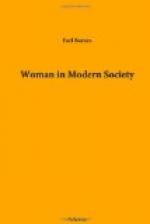A second cause for the unrest of the present is doubtless to be found in the inflexibility of the institution of the family, under which lovers are allowed to live together and bring into existence the children of their love. The family, as we have it, was shaped under the stress of mediaeval disorder. In such a time men are willing to pay any price for peace and quiet. And so the barbarian invaders, living among the broken fragments of Greek and Roman civilization, gradually shaped feudalism, culminating in absolute monarchy, which gave them political security. They shaped the Holy Roman Catholic Church that they might worship in peace. They shaped the guilds that they might work quietly, and enjoy the fruits of their labors. The family, with its civil and ecclesiastical sanctions, was formed to protect the personal lives of men and women who wished to live together and rear children.
But with peace, life grew stronger and more intense; and the bonds which the people had shaped, and which had given them security, reached their limits of growth, became painful, and threatened to prevent all further development. The rising cities bought their freedom from feudal lords; even the serfs won better conditions; and the rising national units beat down the older political institutions with their swords. Finally the movements that gather around the French Revolution opened the way for us into the democratic freedom and security which we enjoy to-day. The guilds were broken up and a measure of freedom was secured, though the industrial institution which shall give us freedom and security in our work is yet to be formed. The Protestant Revolution led us by devious ways into religious freedom where men can worship as they will.
Of all these older institutions, shaped under iron necessity, the only one that remains practically unchanged is the family. Dealing with the most powerful of all our human hungers, as it does, we have not dared to make it fit our modern life. Not only is this true, but the forces of the older state and church which survived, fastened themselves upon this institution and strengthened its resisting power. The church increasingly made marriage into a holy sacrament, so that it not only protected lovers, but became a subtle, inviolable and indissoluble mystery. The state sanctioned the family, and made it an instrument for regulating political and property rights. Formal society proclaimed the family and made it the standard for respectability.
Two centuries hence, our family, with its sacramental significances, its lack of a eugenic conscience, its financial subordination of women, its frequent lack of love and sympathy, its primogeniture, and its determining power over social opportunity, will be as incomprehensible to students of institutional forms as the Holy Roman Empire is to us to-day. Who will then understand how church and state could have licensed and consummated marriages between young and inexperienced people,




